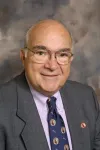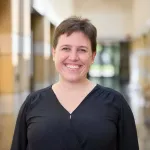(Press-News.org) Anglia Ruskin University (ARU) is leading a new £2 million initiative to help prevent food shortages that could potentially trigger civil unrest in the UK.
The project, called Backcasting to Increase Food System Resilience in the UK, is being led by experts from Anglia Ruskin’s Global Sustainability Institute and has received £2,048,461 in funding from the Biotechnology and Biological Sciences Research Council, part of UK Research and Innovation (UKRI).
Building on recent research that found that over 40% of food experts believe widespread civil unrest linked to food shortages, such as demonstrations and violent looting, is possible or likely in the UK within the next 10 years, the new project aims to urgently address vulnerabilities in the nation’s food supply.
The UK’s food system is currently optimised for efficiency rather than resilience, relying heavily on imports, seasonal labour, and just-in-time supply chains.
This makes it particularly susceptible to disruptions that could lead to a collapse, defined as a situation where the public lack access to affordable food, resulting in economic productivity losses, disease outbreaks, extreme hunger, malnutrition, or civil unrest.
Potential causes of such a collapse include geopolitical instability and conflict around the world, pandemics, extreme weather events exacerbated by climate change, and trade tariffs.
The project aims to identify and find ways of mitigating the potential tipping points that could lead to a collapse and prioritise the areas within the UK food system that urgently need to strengthen their resilience to likely risks and shocks.
To achieve these goals, the researchers will work closely with key stakeholders including food producers, importers, distributers and retailers.
A “backcasting” mapping exercise will be carried out to identify the most likely pathways leading to civil unrest with a focus on addressing problems at the early stages of these pathways, well before any unrest arises.
Anglia Ruskin University is leading the project in partnership with experts from the University of York, the London School of Hygiene & Tropical Medicine, the University of the West of England and the Royal Agricultural University.
Other partners include WTW, the Food Farming & Countryside Commission, the Food Ethics Council, WRAP, DEFRA, Trussell, Sustain, Better Food Traders, Samworth Brothers, the Food Standards Agency, the Institute of Grocery Distributors and WWF.
Professor Aled Jones, Director of the Global Sustainability Institute at Anglia Ruskin University (ARU), said: “The Backcasting to Increase Food System Resilience in the UK project is a major investment into understanding how future shocks could significantly impact the UK food system and how we can build resilience to these.
“The food system is exposed to various risks from climate change and biodiversity loss to geopolitical events, such as wars or cyberterrorism. Supporting the UK’s food system stakeholders from farmers through to retail, by working with them to build on their knowledge to deliver a transformation towards resilience, is vital.
“The project will also involve placements inside organisations focusing on food system challenges, to better understand the interventions that may be possible, and allow wider lessons to be captured and shared. These placements will be open to PhDs from across the UK and will be announced in 2026.”
END
New £2 million project to save UK from food shortages
Anglia Ruskin University leads work to identify vulnerabilities and avoid collapse of UK’s food system
2025-01-30
ELSE PRESS RELEASES FROM THIS DATE:
SCAI mourns Frank J. Hildner, MD, FSCAI: A founder and leader
2025-01-30
The Society for Cardiovascular Angiography and Interventions (SCAI) and the interventional cardiology community mourn the passing of Frank J. Hildner, MD, FSCAI, a founding member and past president (1989-90) of SCAI.
“Dr. Frank Hildner laid the foundation for SCAI’s growth and success. His visionary leadership helped guide SCAI through its formative years, ensuring it would become the trusted home for interventional cardiology. We are deeply grateful for his contributions and will continue to honor his legacy,” said SCAI President James B. Hermiller, MD, MSCAI.
Recognizing the need for a dedicated platform for interventional cardiologists, Dr. ...
New diagnostic tool will help LIGO hunt gravitational waves
2025-01-30
RIVERSIDE, Calif. -- Finding patterns and reducing noise in large, complex datasets generated by the gravitational wave-detecting LIGO facility just got easier, thanks to the work of scientists at the University of California, Riverside.
The UCR researchers presented a paper at a recent IEEE big-data workshop, demonstrating a new, unsupervised machine learning approach to find new patterns in the auxiliary channel data of the Laser Interferometer Gravitational-Wave Observatory, or LIGO. The ...
Social entrepreneurs honored for lifesaving innovations
2025-01-30
DALLAS, Jan. 30, 2025 – An organization that developed a health monitor to continuously track blood oxygen levels and one that launched a digital health platform to provide peer support to people recovering from addiction are the recipients of the 2025 Impact with Heart awards from the American Heart Association. The Association, a global force changing the future of health for all, annually recognizes leaders in innovative entrepreneurship that supports equitable health outcomes.
According to the just released American Heart Association 2025 Heart Disease & Stroke Statistics report, heart disease continues ...
Aspects of marriage counseling may hold the key to depolarizing, unifying the country, study finds
2025-01-30
Research has shown that polarization undermines democracy by driving citizens to prioritize partisan preferences over democratic principles, encourages democratic gridlock and threatens democratic attitudes and norms, such as tolerance for opposition.
Today, Americans are grappling with deep political divides, often seeing those on the other side as untrustworthy, unpatriotic and misinformed — a rift that threatens democracy.
Could marriage counseling hold the key to a more unified country?
A recent study, published in Political Behavior and co-authored by Laura Gamboa, an assistant professor of democracy and global affairs at the Keough ...
With $2 million in new funding, Montana State research lab continues explorations into viruses and honeybee health
2025-01-30
BOZEMAN – With the help of two major grants from the National Science Foundation and the U.S. Department of Agriculture, a team in Montana State University’s College of Agriculture is furthering investigations of honeybee antiviral defense mechanisms with the goal of developing strategies to reduce honeybee colony deaths.
According to Michelle Flenniken, a professor in MSU’s Department of Plant Sciences and Plant Pathology and co-director of the university’s Pollinator Health Center, annual honeybee colony losses have averaged roughly 38% in the ...
Scientists chip away at potato storage problems
2025-01-30
They’re one of the UK’s most loved staples, providing around half of our carbohydrate intake as a nation and supporting over 20,000 farm, transport and manufacturing jobs. Now, new research is focusing on ensuring reliable supplies of the potato all year round with a project that focuses on potato dormancy and extending storage life.
To achieve year-round supplies in the UK, around 1.5 million tonnes of potatoes are kept in cold stores for up to eight months to prevent sprouting. However, following the withdrawal of a chemical that ...
Research update: Generating electricity from tacky tape
2025-01-30
Zaps of static electricity might be a wintertime annoyance, but to certain scientists, they represent an untapped source of energy. Using a device called a triboelectric nanogenerator (TENG), mechanical energy can be converted into electrical energy using triboelectric effect static. Many TENGs contain expensive, specially fabricated materials, but one team has instead used inexpensive store-bought tape, plastic and aluminum metal. The researchers report an improved version of their tape-based TENG in ACS Omega.
The research team, led by Gang Wang and Moon-Hyung Jang, previously stacked layers of a store-bought double-sided tape, plastic film and aluminum metal ...
People’s acceptance of AI judgements on moral decisions: A study on justified defection
2025-01-30
A research team led by Dr Prof. Hitoshi Yamamoto of Rissho University and Dr Prof. Takahisa Suzuki of Tsuda University explored the conditions under which people would accept the moral judgments of AI. They focused on the behaviour of "not helping people with bad reputations (justified non-cooperation)," which is difficult for people to judge as good or bad, to investigate under what conditions people are more likely to accept AI's judgments over human judgments. The study revealed that people tend to be more accepting of AI's judgments when AI makes positive judgments and humans make negative judgments. The research results were published in the ...
Wildfire smoke can carry toxins hundreds of kilometers, depositing grime on urban structures, surfaces: research
2025-01-30
Hamilton, ON, Jan. 30, 2025 – Researchers have shown that plumes of wildfire smoke can carry contaminants hundreds of kilometres, leaving a toxic and lingering footprint which has the potential to be re-released into the environment.
The frequency and severity of wildfires is expected to continue increasing due to climate change. In recent weeks, catastrophic wildfires have devasted Los Angeles, scorching tens of thousands of acres.
Canada’s 2023 wildfire season was the most destructive ever recorded, with an estimated 18.5 million hectares burned. The 2024 season was the second worst on record, with more than 5 million ...
New study highlights AI’s potential to help doctors detect congenital heart defects
2025-01-30
UNDER EMBARGO UNTIL: Jan. 30, 2025, 8:45 a.m. MST
Denver, Colo. ― Congenital heart defects ...
LAST 30 PRESS RELEASES:
Novel camel antimicrobial peptides show promise against drug-resistant bacteria
Scientists discover why we know when to stop scratching an itch
A hidden reason inner ear cells die – and what it means for preventing hearing loss
Researchers discover how tuberculosis bacteria use a “stealth” mechanism to evade the immune system
New microscopy technique lets scientists see cells in unprecedented detail and color
Sometimes less is more: Scientists rethink how to pack medicine into tiny delivery capsules
Scientists build low-cost microscope to study living cells in zero gravity
The Biophysical Journal names Denis V. Titov the 2025 Paper of the Year-Early Career Investigator awardee
Scientists show how your body senses cold—and why menthol feels cool
Scientists deliver new molecule for getting DNA into cells
Study reveals insights about brain regions linked to OCD, informing potential treatments
Does ocean saltiness influence El Niño?
2026 Young Investigators: ONR celebrates new talent tackling warfighter challenges
Genetics help explain who gets the ‘telltale tingle’ from music, art and literature
Many Americans misunderstand medical aid in dying laws
Researchers publish landmark infectious disease study in ‘Science’
New NSF award supports innovative role-playing game approach to strengthening research security in academia
Kumar named to ACMA Emerging Leaders Program for 2026
AI language models could transform aquatic environmental risk assessment
New isotope tools reveal hidden pathways reshaping the global nitrogen cycle
Study reveals how antibiotic structure controls removal from water using biochar
Why chronic pain lasts longer in women: Immune cells offer clues
Toxic exposure creates epigenetic disease risk over 20 generations
More time spent on social media linked to steroid use intentions among boys and men
New study suggests a “kick it while it’s down” approach to cancer treatment could improve cure rates
Milken Institute, Ann Theodore Foundation launch new grant to support clinical trial for potential sarcoidosis treatment
New strategies boost effectiveness of CAR-NK therapy against cancer
Study: Adolescent cannabis use linked to doubling risk of psychotic and bipolar disorders
Invisible harms: drug-related deaths spike after hurricanes and tropical storms
Adolescent cannabis use and risk of psychotic, bipolar, depressive, and anxiety disorders
[Press-News.org] New £2 million project to save UK from food shortagesAnglia Ruskin University leads work to identify vulnerabilities and avoid collapse of UK’s food system



